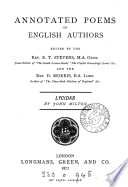Quotes from work
Lycidas

"Lycidas" is a poem by John Milton, written in 1637 as a pastoral elegy. It first appeared in a 1638 collection of elegies, entitled Justa Edouardo King Naufrago, dedicated to the memory of Edward King, friend of Milton's at Cambridge who drowned when his ship sank in the Irish Sea off the coast of Wales in August 1637. The poem is 193 lines in length, and is irregularly rhymed. While many of the other poems in the compilation are in Greek and Latin, "Lycidas" is one of the poems written in English. Milton republished the poem in 1645.

“Blind mouths! That scarce themselves know how to hold
A sheep-hook.”
Source: Lycidas (1637), Line 119

Source: Lycidas (1637), Line 64; comparable to: "Erant quibus appetentior famæ videretur, quando etiam sapientibus cupido gloriae novissima exuitur" (Translated: "Some might consider him as too fond of fame, for the desire of glory clings even to the best of men longer than any other passion"), Tacitus, Historiae, iv. 6; said of Helvidius Priscus.

“He touch'd the tender stops of various quills,
With eager thought warbling his Doric lay.”
Source: Lycidas (1637), Line 188

“But O the heavy change, now thou art gone,
Now thou art gone and never must return!”
Source: Lycidas (1637), Line 37

“At last he rose, and twitched his mantle blue:
Tomorrow to fresh woods and pastures new.”
Source: Lycidas (1637), Line 192